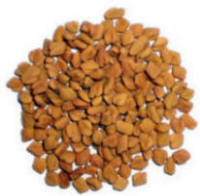Fenugreek
Search Cidpusa webFenugreek Herbal tonic recipe
- Lactation Aid
- Antidiabetic Property
- Cholesterol-lowering Effect
- Immunological Activity
- Broad Spectrum Antibacterial Activity
- Removal of Kidney Stones
-

Potential Dangers
- Allergies
- Side Effects
- Pregnancy
Possible Interactions
- Interactions with Drugs
- Interactions with Herbs and Dietary Supplements
References
Discription
Please read the Fenugreek disease prevention pageGeneral Discription
Fenugreek seed, which is also known as Methi in Urdu and Hindi, Hulba in Arabic is a popular supplement for increasing milk supply in nursing mothers. Fenugreek is a very safe herb to take.
Traditional usage
Fenugreek is one of the oldest cultivated plants and through the ages has found wide application as a food, a food additive and in the traditional medicine of every region in which it has been cultivated. The plant part used as a medicine has generally been the seeds. The Ebers Papyrus of 1500 BC Egypt, lists a preparation of Fenugreek for the skin. The Greek physicians Hippocrates considered it a valuable soothing herb while Dioscorides recommended Fenugreek for all types of gynecological problem. Fenugreek has been used since Biblical times to increase the production of milk for nursing.
Traditional Chinese herbalists used it for kidney problems and conditions affecting the male reproductive tract. Similarly, in Pakistan, India and elsewhere, the leaves, and both the ripe and unripe seeds of Fenugreek are used as vegetables and the ripe seed also, has numerous applications in their traditional medicine system. The seeds also function as a preservative and are added to pickles, chutneys and other similar products. In modern food practice, the seeds or the extract are used in bakery products, frozen dairy products, meat products, relish, condiments, candy, gravy sauces, gelatin puddings and in alcoholic and non-alcoholic beverages. Fenugreek is currently used as a source of the steroid diosgenin , one of its active constituents from which other steroids can be synthesized.
Modern Day Uses
German Commission E approves fenugreek seeds for treatment of anorexia, and for local inflammation. In the rest of Europe, Asia, the Middle East, and Upper Africa Fenugreek seeds used in treating colic flatulence, dysentery, diarrhea, dyspepsia with loss of appetite, chronic cough, dropsy, enlargement of liver and spleen, rickets, gout and diabetes. The seed is stated to be a tonic. It is also used in post-natal cure and to increase lactation in nursing mothers. Modern medicine is beginning to provide confirmation of many of the traditional medicinal applications of Fenugreek seeds.
continued to next page